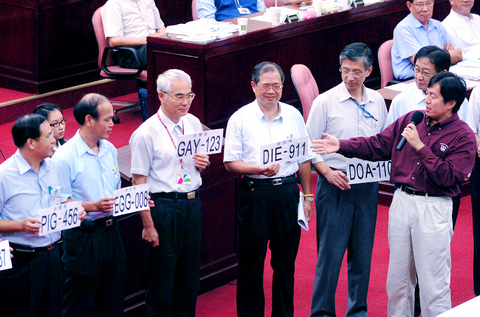As if people in Taiwan didn't have enough to worry about, what with daily doses of bitter political intrigue and a hostile authoritarian power on their doorstep, a new problem was exposed yesterday: their license plates have turned against them.
Although many motorists in Taiwan go to great lengths to personalize their license plates by choosing lucky numbers, if they are not familiar with English, they can't avoid the bad luck of having inauspicious alphabetic combinations, such as "ASS," "DIE" or "DOA."
License plates in Taiwan are made up of two alphabetic letters and four digits for cars, while license plates on scooters have three letters and three digits.

PHOTO: CNA
Drivers and motorists tend to avoid combinations ending in the unlucky number four (si, 四), which sounds similar to "death" (si, 死) in Mandarin, and prefer lucky number combinations using eight (ba, 八), which rhymes with wealth (fa, 發).
However, an independent Taipei City councilor yesterday took the city's Department of Transportation to task for failing to address an equally weighty issue: unseemly combinations of alphabetic characters on many license plates.
"The meanings of some English letters on these license plates are insulting, ill-omened or funny. Drivers are making an ass of themselves by driving cars with such license plates," independent Taipei City Councilor Tim Chang (
During his speech, Chang asked officials from the department to hold mock license plates he had prepared. Officials stood in front of the news cameras holding license plates reading "ASS," "BS," "BUM," "BRA" and "PIG."
"Do you know what `BS' means in English?" Chang asked department Deputy Commissioner Lin Li-yu (林麗玉), who had chosen to hold one of the cards.
"It's an abbreviation for `bullshit,'" Chang told her.
According to Chang, there are more than 500 Taipei motorists who have the inauspicious alphabetic letters "DOA" (dead on arrival) on their license plates, while at least 50 motorists are riding around with license plates inscribed with "DIE."
He urged the department to either allow motorists to change their license plates, or to sift out combinations that would have unpleasant or strange meanings in advance.
Department Commissioner Jason Lin (林志盈) said drivers or motorists could change their license plates, which cost NT$1,250 for a random selection of another set of alphabetic letters and digits. Personalizing license plates would cost at least NT$3,000.
"We suggest that the central government screen the alphabetic letters in advance. But it's up to the government to decide, since it is responsible for manufacturing and distributing the plates," he said.

Intelligence agents have recorded 510,000 instances of “controversial information” being spread online by the Chinese Communist Party (CCP) so far this year, the National Security Bureau (NSB) said in a report yesterday, as it warned of artificial intelligence (AI) being employed to generate destabilizing misinformation. The bureau submitted a written report to the Legislative Yuan in preparation for National Security Bureau Director-General Tsai Ming-yen’s (蔡明彥) appearance before the Foreign Affairs and National Defense Committee today. The CCP has been using cognitive warfare to divide Taiwanese society by commenting on controversial issues such as Taiwan Semiconductor Manufacturing Co’s (TSMC, 台積電) investments in the

INVESTIGATION: The case is the latest instance of a DPP figure being implicated in an espionage network accused of allegedly leaking information to Chinese intelligence Democratic Progressive Party (DPP) member Ho Jen-chieh (何仁傑) was detained and held incommunicado yesterday on suspicion of spying for China during his tenure as assistant to then-minister of foreign affairs Joseph Wu (吳釗燮). The Taipei District Prosecutors’ Office said Ho was implicated during its investigation into alleged spying activities by former Presidential Office consultant Wu Shang-yu (吳尚雨). Prosecutors said there is reason to believe Ho breached the National Security Act (國家安全法) by leaking classified Ministry of Foreign Affairs information to Chinese intelligence. Following interrogation, prosecutors petitioned the Taipei District Court to detain Ho, citing concerns over potential collusion or tampering of evidence. The

‘COMPREHENSIVE PLAN’: Lin Chia-lung said that the government was ready to talk about a variety of issues, including investment in and purchases from the US The National Stabilization Fund (NSF) yesterday announced that it would step in to staunch stock market losses for the ninth time in the nation’s history. An NSF board meeting, originally scheduled for Monday next week, was moved to yesterday after stocks plummeted in the wake of US President Donald Trump’s announcement of 32 percent tariffs on Taiwan on Wednesday last week. Board members voted to support the stock market with the NT$500 billion (US$15.15 billion) fund, with injections of funds to begin as soon as today. The NSF in 2000 injected NT$120 billion to stabilize stocks, the most ever. The lowest amount it

NEGOTIATIONS: Taiwan has good relations with Washington and the outlook for the negotiations looks promising, Minister of Economic Affairs J.W. Kuo said Taiwan’s GDP growth this year is expected to decrease by 0.43 to 1.61 percentage points due to the effects of US tariffs, National Development Council (NDC) Minister Paul Liu (劉鏡清) said at a meeting of the legislature’s Economics Committee in Taipei yesterday, citing a preliminary estimate by a private research institution. Taiwan’s economy would be significantly affected by the 32 percent “reciprocal” tariffs slapped by the US, which took effect yesterday, Liu said, adding that GDP growth could fall below 3 percent and potentially even dip below 2 percent to 1.53 percent this year. The council has commissioned another institution